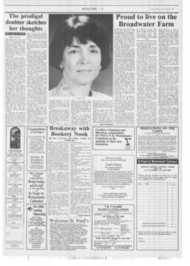Page 7, 2nd August 1991
Page 7

Report an error
Noticed an error on this page?If you've noticed an error in this article please click here to report it.
Tags
Share
Related articles
Baker Accused Of Delay
Imprisoned Woman's Plea To Bishops
The Birmingham Six Talk Of Their Jail Ordeal And Praise...
Inside
An Option For The People Of The Broadwater Farm
Proud to live on the Broadwater Farm
Fr Patrick Towe has been at the forefront of the fight for the Tottenham Three. He tells Joanna Moorhead why
IN 1987, the year the Tottenham Three were sentenced to life imprisonment for the murder of PC Keith Blakelock, the Oblates of Mary Immaculate held a conference to discuss new areas of work. The two events would be unrelated, had the conference not sparked off a chain of events which led Fr Patrick Towe to Broadwater Farm, and thence to the campaign to free the three convicted men.
Today he occupies a first floor flat on the outer edge of the north London estate, and the phone in the hallway rings incessantly with calls about the campaign to free the convicted men. Fr Towe became convinced of their innocence, he says, when he met their families. "They've suffered so much pain. I'll never forget meeting Mary Silcott (mother of Winston, one of the Three) and seeing the look in her eyes, the agony she's been through. It really moved me."
Now, he says, the evidence that the convictions are not safe is so weighty that the Home Secretary will surely soon have to allow Winston Silcott and Mark Braithwaite leave to appeal. (The third man, Engin Raghip, has already been granted an appeal date in November.) Last week's announcement of a police inquiry is a move in the right direction, but there are still many battles to fight before the war is won.
The war has its roots, of course, back in that October evening in 1985 when Broadwater Farm became the site of riots which the police later described as the worst ever seen on mainland Britain. Fr Towe has no memories of that night: he was hundreds of miles away at the time, working in a parish in Ireland.
It was only two years later, after the Oblates conference decided that their future lay in working with the disadvantaged, that he decided his future lay at Broadwater Farm. In February last year he moved into a flat in a quiet block usually reserved for pensions, next door to 82year-old Vi who has a fund of stories about that night.
She remembers the way the sky suddenly lit up with a huge red flare, and how a group of rioters nearly managed to climb over the railings into the terrace behind their block.
These days the terrace is quiet and peaceful, and Fr Towe can sit out there on sunny days contemplating his tub of brightly coloured flowers and his socks drying on the clothes horse. He never intended, he says, to live alone in Broadwater Farm. "Oblates usually live in community, and I thought a few of us would move in here. But then I was the only one who volunteered."
He came all the same. "It's really important to live alongside people in a place like this, to properly share their experiences. I feel I'm taking the church to people who wouldn't usually be touched by it. And they do appreciate my being here — they say it's made a difference to their lives."
Catholics who wouldn't normally have gone to Sunday mass now attend the weekly eucharist he celebrates in the estate social centre, and he takes communion to elderly housebound neighbours.
But even more important, he's shown the people of Broadwater Farm that the church does care about them. And he's been able to help, too, with the formation of better co-ordinated residents' committees — a residents' council, established recently, has elected him its first chair.
One of the council's main projects will be to work towards better relations with the police. "There's still tremendous suspicion on both sides, and quite honestly as long as allegations about the way the confessions of the Three were obtained continue to be made, it's going to be difficult. People on both sides have been so hurt. Whether there can ever be a full relationship after what's happened I don't know . . . but certainly, the case of the Tottenham Three will have to be resolved first."
By resolved, of course, he means dismissed. Fr Towe is the church's liaison person on the Tottenham Three Families Campaign, in which role he has courted the support of Bishop Philip Harvey, local congregations, and other denominations' church leaders. "It's very important to have church leaders on our side. Their views carry a good deal of weight."
He hopes to interest Cardinal Hume, who has so far failed to make any statement on the case but whose backing of the Guildford Four and Birmingham Six was vital in overturning the verdicts. "I've written to him. Until now he's been saying he's been very busy with the Maguire case to get involved with this one, but I hope he will find time soon."
Like the Irish people at the centre of the Guildford, Birmingham and Maguire cases, believes Fr Towe, the Tottenham Three arc being allowed to languish in prison because they are members of an ethnic minority. "I think we have to ask ourselves whether they are less willing to review these cases because the people involved are black. We've got to acknowledge that racism is an issue here," he says.
The riots, and the killing of PC Blakelock, still cast a long shadow over Broadwater Farm but, says Fr Towe, there's lots to rejoice about in the estate.
There's an untold story at Broadwater Farm, about people working together for a better environment." Fr Towe is proud to be playing his part in it.
blog comments powered by Disqus











